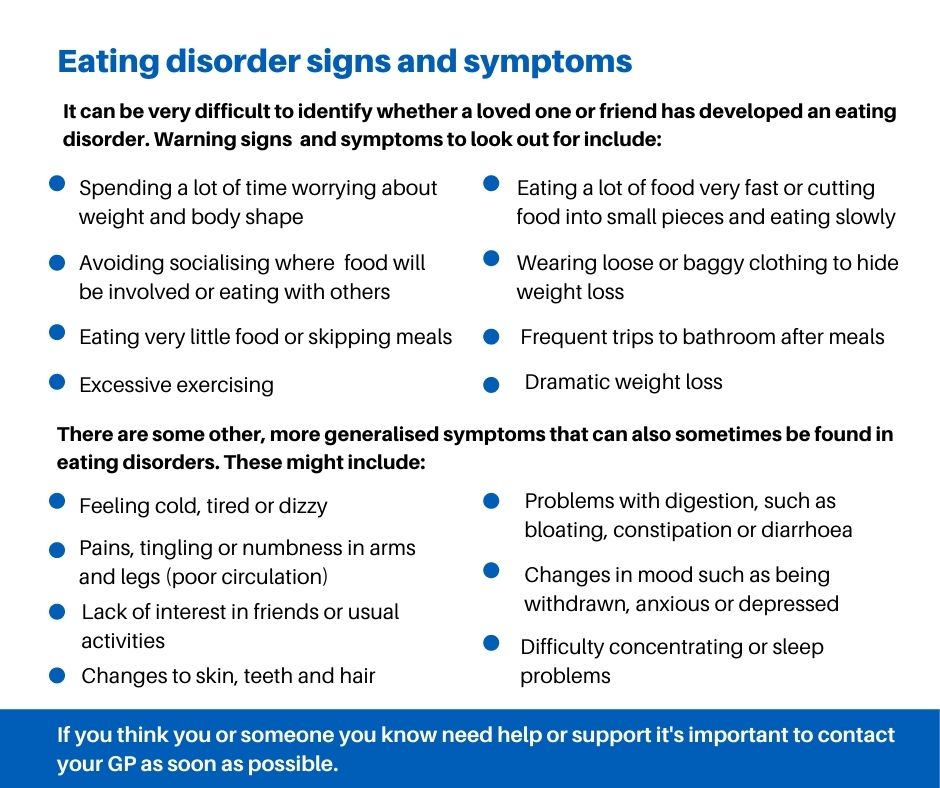
During Eating Disorders Awareness Week, staff from Tees, Esk and Wear Valleys NHS Foundation Trust (TEWV) and Cumbria, Northumberland, Tyne and Wear NHS Foundation Trust (CNTW), who provide eating disorders services for adults and young people across the North East and North Cumbria, are raising awareness of knowing the signs and symptoms to look for and the importance of seeking help and support early.
One in 50 people in the UK experience an eating disorder at some point in their life, many of whom are adolescents and young people. If action is taken and problems are addressed early enough, further long-term damage and problems can be prevented.
Nick Wolstenholme, Consultant Psychiatrist at TEWV said: “Many people think an eating disorder is just to do with food, but it’s actually a mental health condition and the eating behaviours and patterns can negatively affect physical and mental health. It’s important to act fast to address the problems people are facing and to take the right course of action.”
Dr Andrew Brittlebank, consultant psychiatrist at, CNTW said: “It’s essential to educate and encourage young people, parents and carers, GPs and other healthcare professionals to recognise the early stages of an eating disorder. By having a better understanding, they will be able to seek help sooner and hopefully prevent any further chronic long-term conditions from developing.
“Research shows that if you can reach and engage with someone within the first three years of their problems starting, you have a much better chance of reversing any damage the illness can cause to a person’s brain or body.”
The Trusts, who work in partnership as the North East and North Cumbria Eating Disorder Provider Collaborative, have compiled some simple advice and guidance for people regarding what to look for and how to seek support.

You can also view these three short videos:
Tom Rebair, a young man from Newcastle who has struggled with anorexia, now campaigns to raise awareness of the disorder. In a blog post about his own experiences of an eating disorder, and what signs to watch out for in yourself and others, he says: “If you are going through this, or have gone through it in the past, you might feel like you’re doing this alone and nobody knows how it feels. But you’re not! I’ve been there, and so have lots of other people. You can get through it and become a much stronger person for it.” He encourages people to reach out for professional help if they are struggling.
FREED (First Episode Rapid Early Intervention for Eating Disorders Pathway)
In July 2021, TEWV became one of 18 accelerated implementation sites across England for the FREED (First Episode Rapid Early Intervention for Eating Disorders) pathway. FREED is an innovative service for 16 to 25-year-olds who have had an eating disorder for three years or less. It enables rapid access to specialised treatment which gives special attention to challenges young people face during these years of their life, and in the early stages of an eating disorder.
Under the FREED approach, people referred to TEWV’s eating disorder services in County Durham and Tees Valley are contacted by a dedicated eating disorder nurse within 48 hours of referral to talk about their condition and put in place next steps in terms of care and treatment. Anyone needing specialist secondary mental health care then receives treatment within four weeks to provide help and support and quickly as possible.
TEWV Senior Eating Disorders Practitioner, David Tate said: “We’ve implemented the FREED pathway across children’s and adult services in order to reach 16–25-year-olds and to date this has helped over 60 young people to receive quick access to specialist eating disorder treatment and support.”
Following the success of the pathway in TEWV’s North East services, there is a shared commitment and drive to further embed the FREED approach across the North East and North Cumbria.
Andrew McMinn, Associate Director for Neurological and Specialist Services at CNTW, said: “We are excited to be working closely with TEWV and our Clinical Commissioning Groups to implement the FREED model across the communities we serve. The evidence is clear that the earlier we can provide people with support, the better outcomes they can have. In North Cumbria our teams are applying FREED principles to fast-track people struggling with eating disorders into assessment and treatment, and we have also established a dedicated Community Adult Eating Disorder Service working within our Community Mental Health Teams across the north east – and more work is underway to further embed the FREED model throughout our services.”
Paul Johnson, Mental Health Workstream Lead at the Academic Health Science Network North East and North Cumbria (AHSN NENC), which is supporting regional partners to take the FREED approach forward, said:
“Ensuring the right early care for young people with an eating disorder is vital and the FREED approach aims to overcome barriers to early treatment and recovery, as well as bridging the gap between child and adult services.
“We are delighted to have supported TEWV to become an accelerated implementation site for the FREED approach across both its children’s and adult services. It is a credit to all involved that this has been implemented during times of extremely high pressure both on services and on the people who use them.
“The progress made to date by the team at TEWV to implement FREED has been fantastic, and it’s incredibly encouraging to see the benefits it is already bringing to people accessing the service. We look forward to continuing to work closely with our regional partners to further embed the approach across the North East and North Cumbria.”
If you are worried you may have an eating disorder or concerned someone you know might have an eating disorder, please speak to your GP or local mental health service.
